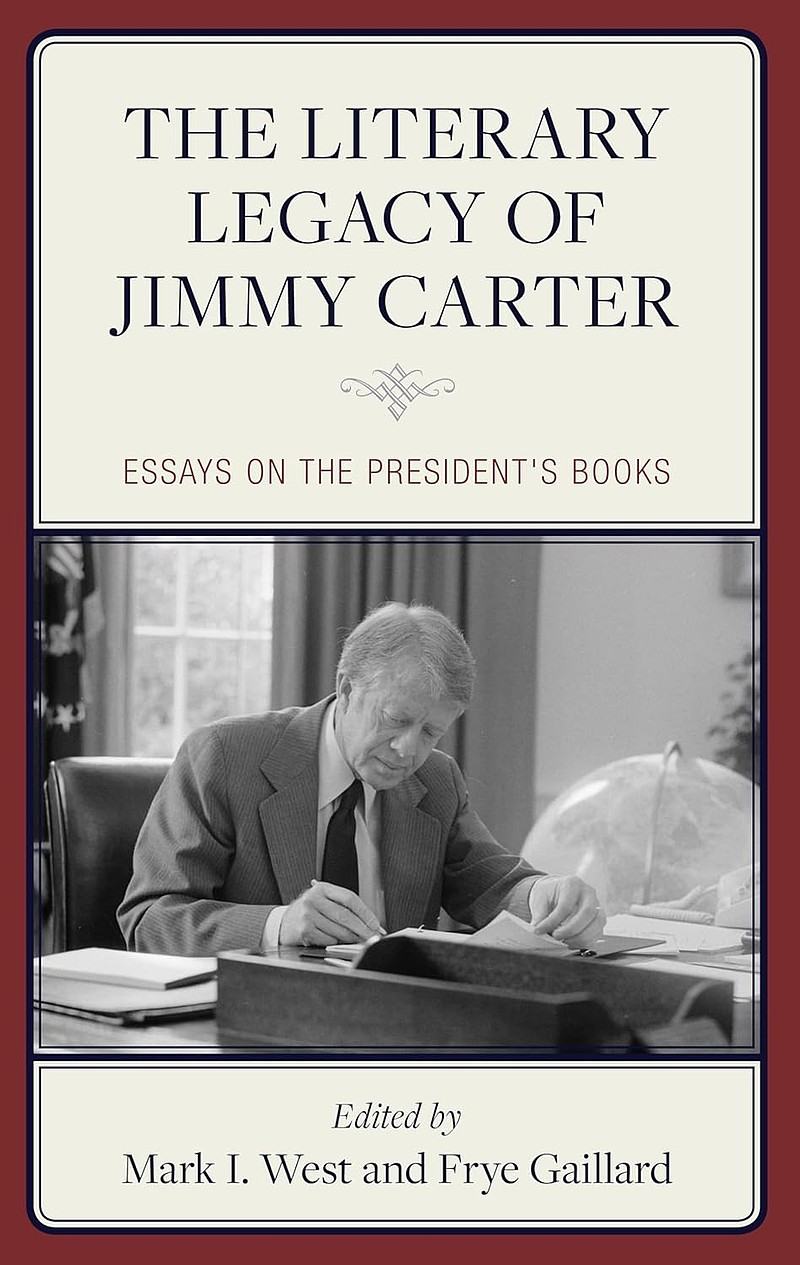“THE LITERARY LEGACY OF JIMMY CARTER: ESSAYS ON THE PRESIDENT’S BOOKS,” edited by Mark I. West and Frye Gaillard (Rowman & Littlefield, 344 pages, $120).
When Jimmy Carter died last December at age 100, the obituaries naturally focused on his presidency, as well as the humanitarian and human-rights work that earned him a Nobel Peace Prize. His prodigious literary output didn’t get a lot of attention, but as Mark West and Frye Gaillard point out in their introduction to “The Literary Legacy of Jimmy Carter,” he penned more than 30 books without the help of a ghostwriter, and his writing “provides a window into the workings of his mind.”
The 22 essays in the anthology, contributed by scholars, journalists and one poet, survey the breadth of Carter’s body of work, from memoir and fiction to controversial political analysis. Gaillard describes the book as “the brainchild” of co-editor Mark West, who has written or edited 21 books, including “Theodore Roosevelt on Books and Reading.” Gaillard himself interviewed Carter multiple times over the years for a series of articles and for Gaillard’s 2007 book, “Prophet from Plains.” He answered questions about “The Literary Legacy of Jimmy Carter” by email.
Q: Charlotte Pence’s essay about Jimmy and Rosalynn Carter’s post-presidency memoir “Everything to Gain” notes the sharp, almost shocking cultural and political differences between the U.S. of the 1980s and now. Were you struck by that as you worked on this book?
A: I thought Charlotte’s essay was one of the strongest in the book. In a way, it does offer a startling contrast between our self-involved culture of today and the moment when Jimmy and Rosalynn Carter were processing the former president’s electoral defeat in 1980. But to me, as with so much about the Carters, their message represents a kind of timeless rebuke to the selfishness and growing indifference to the common good that we see and feel all around us today.
Q: Carter famously refused to use ghostwriters, and his sole novel, “The Hornet’s Nest,” got high marks for research and accuracy but was described by one reviewer as “an epic slog.” What’s your frank opinion of his writing gifts and prose style overall?
A: Having read “The Hornet’s Nest,” I would agree with that assessment of it. That said, I also wrote the chapter about Carter’s presidential memoir, “Keeping Faith,” and I thought it was riveting. Not only did it describe dramatic historical events like the Camp David peace negotiations, it also demonstrated Carter’s quite remarkable sense of story. “Keeping Faith” begins and ends with his last day in office when he was working — doggedly and successfully — to achieve the release of U.S. hostages held in Iran.
In addition to this presidential memoir, my co-editor Mark West and I agree that Carter’s best, most deeply felt book was probably “An Hour Before Daylight,” his reflections on his Depression-era boyhood outside of Plains. It is both tender and candid, quite revealing, among other things, about his youthful encounters with Jim Crow.
Q: There’s a quote in one of the essays from Carter biographer Douglas Brinkley, noting that Carter was sometimes accused of dropping names like James Agee and Dylan Thomas as a “political ploy” to attract young people and intellectuals. Do you think there was ever any insincerity in his public passion for literature?
A: I’m not a big fan of Douglas Brinkley, and I’m not sure I agree with him about that. I mean, maybe some people thought Carter’s references to Dylan Thomas — or Bob Dylan, for that matter — were a “ploy.” But I don’t think so. I think he was genuinely moved by the written word.
Q: Surveying Carter’s literary output necessarily creates an overview of his life and presidency. A common assessment is that his years out of office were more successful than his time in the White House. What do you think?
A: I think Carter’s life after the White House certainly became the gold standard for a vigorous post-presidency — in ways that were sometimes surprising. He did not, for example, always assume the stance of an elder statesman above the fray. His most controversial book, “Palestine: Peace Not Apartheid,” angered many Israelis and Jewish Americans. And Nancy Mitchell’s chapter about that book is one of the strongest essays in “The Literary Legacy of Jimmy Carter.”
But I agree with Carter biographer Jonathan Alter that Carter’s time in the White House represented a consequential presidency. The Camp David peace accords between Israel and Egypt were certainly a monumental achievement. In her chapter in our book, Charlotte Pence writes about President Carter presiding over a dramatic increase in the rate of childhood vaccinations. And in managing the moment that probably cost him reelection — the Iranian hostage crisis — Carter’s diplomacy not only kept our diplomats alive but brought them all home. The glib inclination to give President Reagan credit for that was simply not true.
To read an uncut version of this interview — and more local book coverage — please visit Chapter16.org, an online publication of Humanities Tennessee.
 Rowman & Littlefield / “The Literary Legacy of Jimmy Carter: Essays on the President’s Books”
Rowman & Littlefield / “The Literary Legacy of Jimmy Carter: Essays on the President’s Books”
